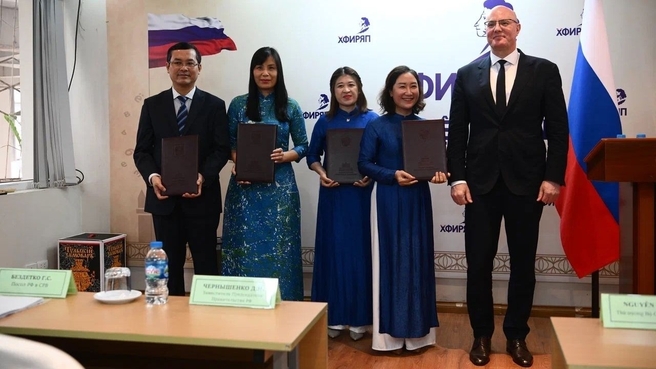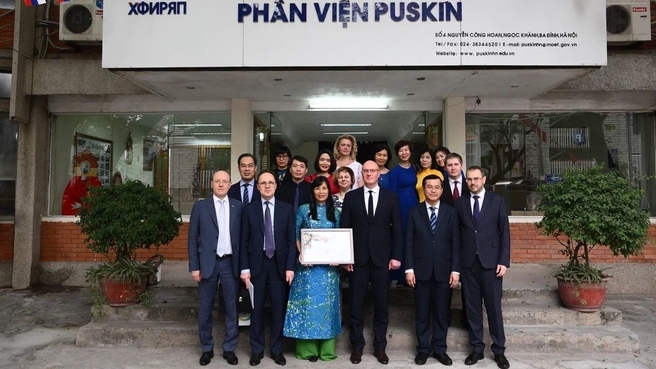As part of his visit to Vietnam, Dmitry Chernyshenko met with students and Russian language teachers from two universities
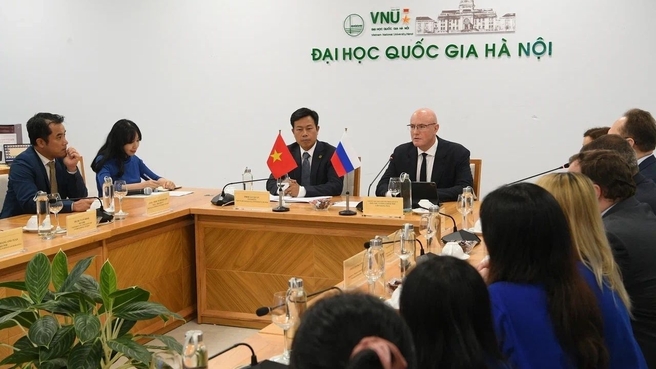
Dmitry Chernyshenko meets with students and teachers of Russian studies at Vietnam National University, Hanoi
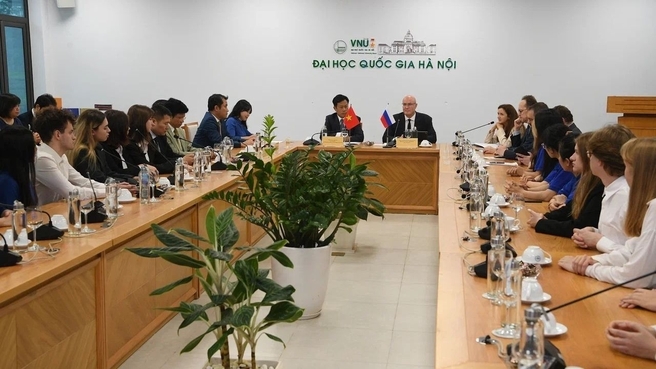
Dmitry Chernyshenko meets with students and teachers of Russian studies at Vietnam National University, Hanoi
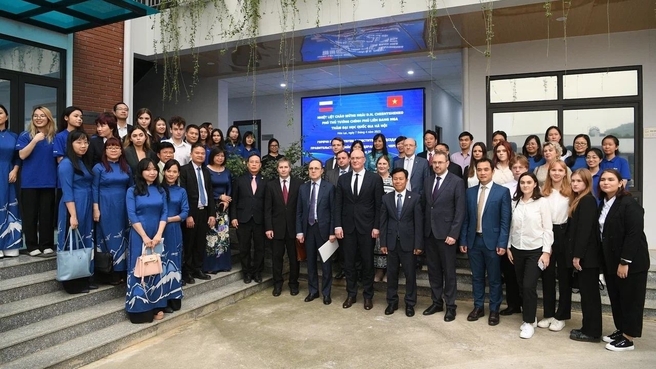
Dmitry Chernyshenko meets with students and teachers of Russian studies at Vietnam National University, Hanoi
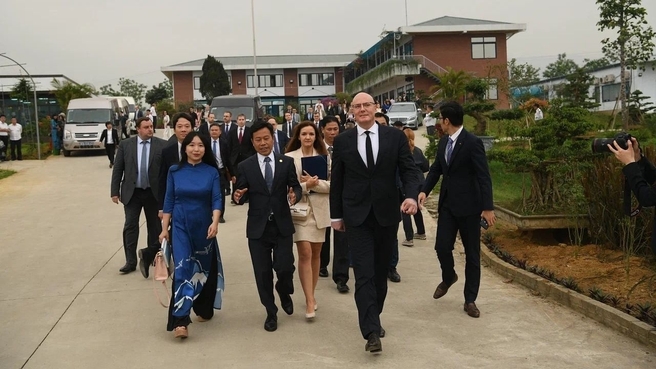
Dmitry Chernyshenko meets with students and teachers of Russian studies at Vietnam National University, Hanoi
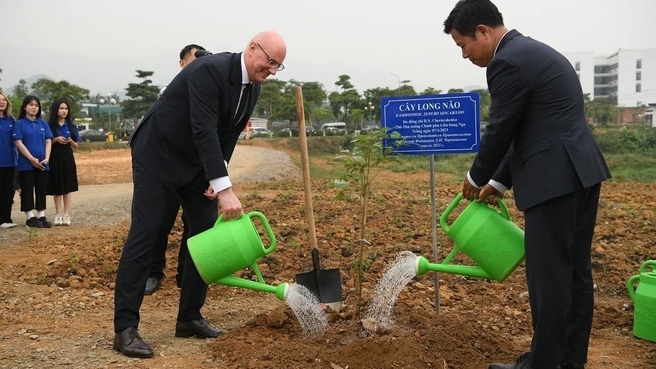
Dmitry Chernyshenko meets with students and teachers of Russian studies at Vietnam National University, Hanoi
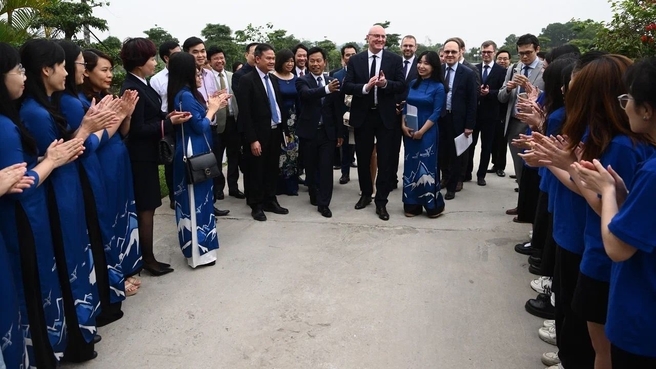
Dmitry Chernyshenko meets with students and teachers of Russian studies at Vietnam National University, Hanoi
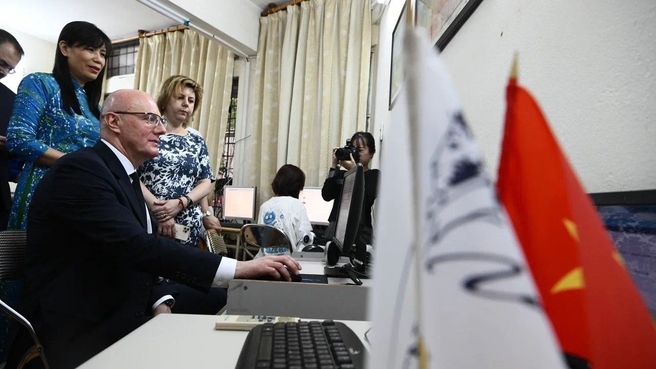
Dmitry Chernyshenko meets with students and teachers of Russian studies at the Hanoi branch of the Pushkin State Institute of the Russian Language
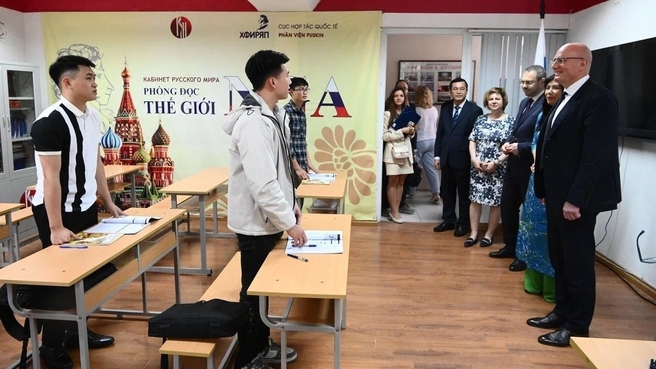
Dmitry Chernyshenko meets with students and teachers of Russian studies at the Hanoi branch of the Pushkin State Institute of the Russian Language
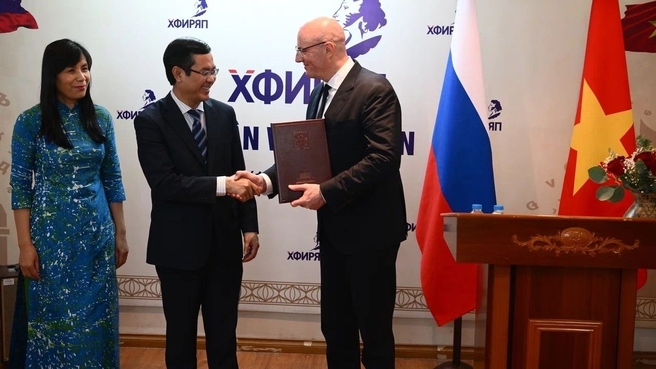
Dmitry Chernyshenko meets with students and teachers of Russian studies at the Hanoi branch of the Pushkin State Institute of the Russian Language
Dmitry Chernyshenko meets with students and teachers of Russian studies at Vietnam National University, Hanoi
As part of his visit to Vietnam, Deputy Prime Minister Dmitry Chernyshenko met with students and Russian language teachers from two universities. One of them, the Hanoi branch of the Pushkin State Institute of the Russian Language, is to be transformed into a regional centre to promote Russian in Southeast Asia.
Taking part in the meeting were Deputy Minister of Science and Higher Education of Russia Konstantin Mogilevsky, Deputy Minister of Education and Training of Vietnam Nguyen Van Phuc and Director of the Hanoi branch of the Pushkin State Institute of the Russian Language Nguyen Thi Thu Dat.
Russia and Vietnam have longstanding close ties in various areas of cultural cooperation, primarily in the field of education. In this regard, the Hanoi branch of the Pushkin Institute plays an important role in the cooperation between the countries, training highly qualified Russian-speaking personnel.
“The Russian language has been a bond between our countries’ cultures for many decades. Today, more than 3,000 Vietnamese students are studying at Russian universities in various specialties, from education to oil and gas exploration. The Russian Government has allocated one of the largest quotas for the current academic year: 1,000 places for Vietnamese students. And here, in Vietnam, the Hanoi branch of the Pushkin State Institute of the Russian Language has been around for more than 30 years, serving the noble mission of preserving and passing on the traditions of studying Russian. We plan to bring this work to a qualitatively new level and transform this branch into the Russian language centre for Southeast Asia,” Dmitry Chernyshenko said.
The institute hosts educational events that promote the popularity of Russian literature and culture in the country. In this context, the Deputy Prime Minister handed the Government’s commendation letters to the institute’s team for its contribution to strengthening friendship and cooperation between the Russian Federation and the Socialist Republic of Vietnam.
Individual thank you letters were given to the Institute’s Director and Russian language professor Nguyen Thi Thu Dat, and other teaching staff members for their contribution to promoting the Russian language and Russian culture.
Dmitry Chernyshenko also announced the decision to hold the Week of Vietnam in Moscow in mid-April. The programme includes scientific and educational roundtable discussions of Vietnam’s art and culture.
Noting the important role of a country’s national culture in the study of its language, Konstantin Mogilevsky gave his colleagues books on Russian history and culture. “In studying a language, one develops an interest in the history and culture of the country of its origin. I hope that manuals, workbooks and popularly written books about Russian history and novels by our great writers will make Vietnamese students more interested in learning the Russian language. We are sincerely happy that Russian education remains appealing to Vietnamese students, and we are willing to expand our cooperation,” said the Deputy Minister of Science and Higher Education of Russia.
The Russian delegation then visited Vietnam National University, Hanoi. It was welcomed by students and Russian language and literature teachers. They discussed the importance of promoting the Russian language in Vietnam.
The meeting took place on the modern campus of VNU that educates professionals in various areas. The Deputy Prime Minister emphasised that Russia is very interested in this venue because it is rapidly developing a programme for building world-class student campuses.
“This modern infrastructure is aimed at scientific and technical development. Its goal is to attract talented young people, including those from friendly countries, to different regions of our country. Relying on the best world practices, our universities with their campuses will be the growing points of regional economies. Today, Russia is building 17 world-class campuses. In this context, I would appreciate it if you could share with us your experience in building your campus and tell us about the plans for your university,” Mr Chernyshenko said to his Vietnamese colleagues.
In 2021 and 2022, experts selected 17 projects to build world-class campuses in Nizhny Novgorod, Ufa, Yekaterinburg, Kaliningrad, Chelyabinsk, Moscow, Novosibirsk, Tomsk, Samara, Perm, Yuzhno-Sakhalinsk, Ivanovo, Archangelsk, Tyumen, Khabarovsk, Novgorod the Great, and the Sirius federal territory. The programme to build modern campuses on instructions from Prime Minister Mikhail Mishustin is continuously monitored by Minister of Science and Higher Education of Russia Valery Falkov.
The Deputy Prime Minister also noted that to develop scientific and education cooperation, it is necessary to step up work on creating a Russian-Vietnamese consortium of technical universities based on MPEI National Research University in cooperation with the Moscow Aviation Institute (National Research University) and Vietnam National University, Hanoi. This consortium will provide industry, including energy engineering, with highly qualified professionals capable of resolving the most challenging problems.
In conclusion, Dmitry Chernyshenko took part in planting a tree on the campus as a symbol of friendship between the two countries.
After visiting the universities, the Deputy Prime Minister inspected a potential site for a Russian school in Hanoi. He was accompanied by representatives of the Ministry of Science and Higher Education, the Ministry of Education and the Company on Property Management Abroad. This project was discussed at the meeting of the Russian-Vietnamese Intergovernmental Commission on Trade, Economic, Scientific and Technical Cooperation held the day before and at a meeting with Prime Minister of Vietnam Pham Minh Chinh.
